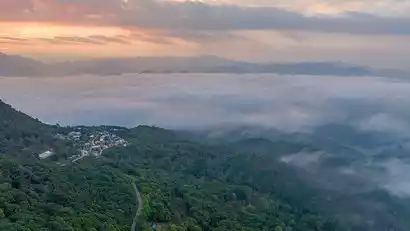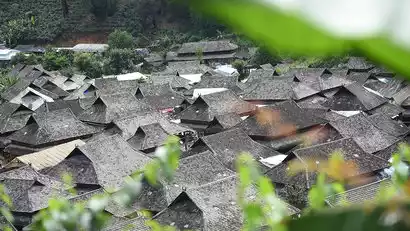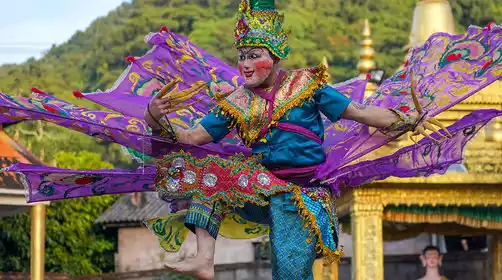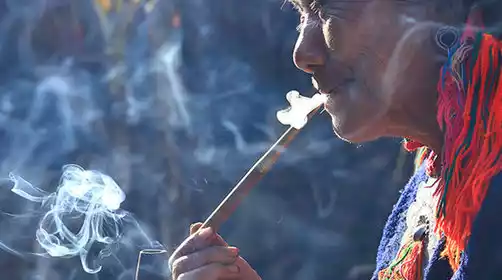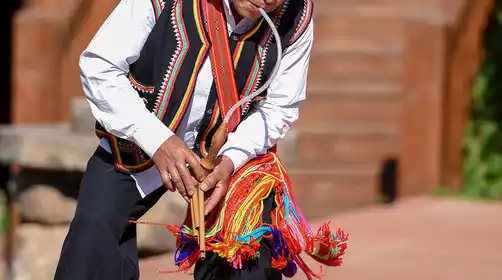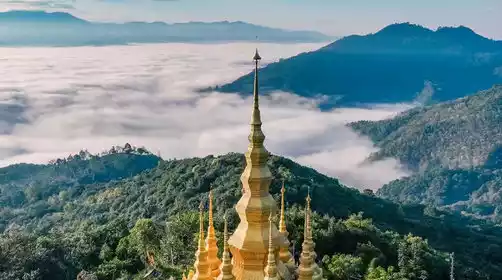Day 1 Various locations → → Pu'er ★ Gathering day
All day
On the all-day gathering day, tourists from around the country will arrive at their hotels in Pu'er and check in. After checking in, they can begin their exploration of the city. Pu'er, the starting point of the Ancient Tea-Horse Road, is the birthplace of the world-renowned Pu'er tea, as well as coffee cultivation, which began in the 1950s. Upon arrival in Pu'er, you can explore the surrounding coffee estates (such as Xiaoaozi Coffee Estate and Yeyatang Valley Estate) or the nearby tea mountains (such as Yixiang Mountain and Dadugang) on your own. Please exercise caution during this free time.
How to get to Pu'er
The collection hotel is located in the city of Pu'er, about 4km away from the airport (Pu'er Simao Airport), and the drive takes about 15 minutes.
Direct flight to Pu'er: For tourists with limited time, you can choose direct flight (direct flights are relatively rare);
Transfer in Kunming: There is one flight from Kunming to Pu'er every day. You can choose to transfer in Kunming, which saves both time and cost.
Kunming-Pu'er High-Speed Train: High-speed trains are now available from Kunming to Pu'er. The journey takes about 3 hours, with frequent departures daily. Please check the specific departure times and fares in real time.
Jinghong-Pu'er train: Take the train from Xishuangbanna to Pu'er, which takes about 40 minutes. Tourists who arrive in Jinghong late and cannot take the bus to Pu'er can choose to take the morning train to Pu'er Station to meet up with the group.
Day 2 Pu'er → Menglian
·morning
Trace the origin of coffee farms and witness the process from coffee seeds to cups
If Pu'er tea is the A-side of the region south of the Tropic of Cancer, coffee is its B-side. The region's unique geographical and climatic conditions allow coffee to fully absorb the natural elements, while the ingenuity of coffee growers imbues the beans with diverse flavors. Boutique coffee farms are slowly blossoming in Pu'er, becoming a key source of green beans for numerous coffee brands. Step into a coffee farm and become a farmer yourself, observing the coffee growing in the fields, listening to the stories of the coffee growers, and finally, brewing your own pour-over cup under the guidance of a teacher. Enjoy unlimited coffees of varying flavors, witnessing the journey from seed to cup, and leaving you with an unforgettable experience.
·afternoon
Enjoy a light hike in the tropical rainforest, with waterfalls and lush greenery.
Menglian has a subtropical climate. High heat and humidity are the primary characteristics of tropical rainforests, driving rapid plant growth. Upon arrival in Menglian, we'll embark on a light hike through the rainforest, ascending a stream-side trail through the lush greenery of the rainforest. At the end of the trail, a cascading waterfall, nestled against the backdrop of typical rainforest vegetation, creates a truly stunning photo opportunity.
Special Experience: Visit a Dai Family and Experience the Festive Atmosphere
丨Let's set off high-rise and earthen fireworks together and pray for good weather and good harvest
After our rainforest hike, we arrived at a Dai village at the foot of the mountain. We visited the home of a Dai teacher who diligently passed down Dai arts and participated in a series of traditional Dai Water-Splashing Festival activities. One of these activities was releasing a kaosheng (a type of firecracker), meant to carry away suffering and disease, bringing good weather and abundant harvests. Local artisans crafted the kaosheng from bamboo and loaded it with gunpowder. During the Water-Splashing Festival, the kaosheng (firecracker) is launched from kaosheng stands around the village. Upon ignition, the shrill "squeak, squeak, squeak" of fire soars into the sky. Villages compete to see whose kaosheng flies the highest. We were divided into groups in advance and each team claimed their own kaosheng to compete.
After nightfall, we will go to an open area to set off local fireworks.
丨The Dance of the Divine Bird is presented, and you will be mesmerized by the folk art of the Dai people
The teacher is a master of music and dance, and is known for his specialties such as the Kinnara Dance, the Wax Strip Dance, the Long Armor Dance, and the Red Deer Dance. These dances are part of the Xuanfusi ritual music and dance, and most are listed as intangible cultural heritage. We will enjoy a performance by the teacher and his students in front of the Golden Pagoda. The Divine Bird Dance, performed in human-faced bird costumes, is particularly breathtaking. The delicate peacock tail feathers, bound to the body, open and close, create a graceful and agile dance, blending grace and power. After the performance, if you're interested, you can interact with the teacher, learn some dance moves, and try on the Divine Bird Dance props.
After enjoying the dance, you will enjoy a Dai dinner at the teacher's home and hear stories about her journey to pass on the art. Throughout her thirty-year dance career, the teacher has not only continuously recruited students and passed on the art, but has also continuously innovated. A representative example is the lightweight props for the Divine Bird Dance, making performances more labor-efficient. However, she often feels the difficulty of passing on the art.
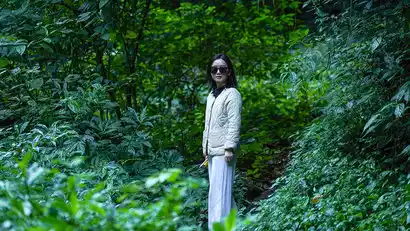
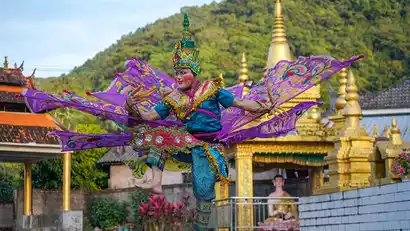
Day 3 Menglian full day
·morning
Feel the fireworks and experience the local food culture at the Menglian Morning Market
The bustling atmosphere of a city is concentrated in the morning market. There are many strange foods in Menglian's morning market, which are colorful and dazzling. You may have never seen them before. Some of them you have tasted in the special meals in the past few days but have never seen before. Chat with the locals, learn about various wild vegetables and their cooking methods, and marvel at the locals' imagination for food.
Wander around Nayun Ancient Town and experience the ancient history of the Dai people
Nayun Ancient Town is a rare surviving Dai ancient town. Divided by a strict registration system into three towns—the Upper Town, the Middle Town, and the Lower Town—and two villages, Mangfanggang and Mangfangmao, Nayun Ancient Town is a unique example of the Dai feudal system, influenced by the cultures of the Central Plains, Southeast Asia, and India. Allow plenty of time to explore the ancient town's official residences, residential buildings, Buddhist temples, pagodas, official roads, sacred trees, the village center, and ancient wells.
Special experience: Visit the intangible cultural heritage teacher and experience paper cutting and gold water clepsydra
Dai paper-cutting is a national intangible cultural heritage. Common motifs include peacocks, elephants, red deer, swimming fish, and various exotic animals and birds. Other motifs include bamboo houses, pagodas, temples, and Dai figures, reflecting everyday life and possessing a distinct local flavor. Gold-water clepsydra, a technique derived from Dai paper-cutting, involves cutting out desired shapes and then applying gold or gold foil to them. It is often used as a temple decoration, and the golden patterns against the dark red walls appear particularly resplendent. We will learn Dai paper-cutting and gold-water clepsydra from an intangible cultural heritage inheritor, and then create our own souvenir.
·afternoon
Free water splashing in Menglian County, join the festival carnival
After lunch, we'll rest briefly before setting off on foot. Bring your own water splashing gear and join the water splashing carnival in Menglian County. Along the way, everyone you meet, whether you know each other or not, splashes water enthusiastically, wishing each other well. Their smiles reflect the festive joy. You can join a group or go it alone, splashing water all the way to Nayun Square.
·night
Release water lanterns and Kongming lanterns on the Nanlei River to pray for a better life
The release of Kongming lanterns and water lanterns is also a major tradition of Songkran. On the day of the festival, people light Kongming lanterns and float them into the sky. Various water lanterns, such as pagodas and lotus flowers, are released into rivers and streams to express their wishes for a better life. At night, people gather at the Nan La River to release Kongming lanterns and water lanterns and make wishes for good fortune.
PS: If it is not possible to release Kongming lanterns due to local fire prevention policies, the project will be cancelled. Thank you for your understanding.
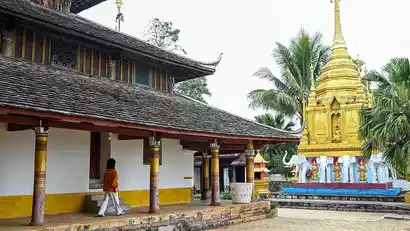
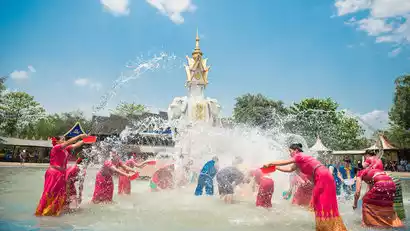
Day 4 Menglian → Ximeng
·morning
Enjoy a light hike to Mengsuo Longtan and experience primitive worship at Longmoye Holy Land
In the morning, we'll depart for Ximeng County and enter the Mengsuo Longtan Scenic Area. We'll then journey to the Longmoye Sacred Land, home to a site covered in ox heads. The Wa people, who have inhabited the Awa Mountains for generations, believe in animism and have long considered oxen sacred and totem. Step inside Longmoye and experience the power of this primal worship, captivated by the solemnity and myriad forms of the ox heads.
·afternoon
Immerse yourself in the singing of Wa people and celebrate with local people
After visiting Mengsuo Longtan, we'll drive into the Awa Mountains and head to a Wa village on the border. While the village has been completely renovated, its traditional fire pits and ancient tunes remain, and many inheritors of this intangible cultural heritage live there. Upon arrival at the village gate, fellow Wa people line up and sing resounding, joyful songs to welcome us. Once inside, we'll join them in shooting crossbows, playing spinning tops, singing Wa songs and dances, and finally singing "The Awa People Sing New Songs." A glass of wine will connect our hearts.
Special Experience: Learn to Cook a Wa Dish and Get Intoxicated by Wa Songs
The subtropical monsoon of the Awa Mountains brings abundant natural resources. The Wa people, with their ingenuity, use natural ingredients to prepare dishes using traditional methods such as steaming, pounding, and mixing, preserving their green and simple nature. We will follow our Wa guide into the mountains to pick wild vegetables, learn a Wa dish or two, and prepare a special feast for ourselves. After enjoying the meal, a bonfire will be lit, and Wa men and women will play wooden drums, perform a hair-flipping dance, sing a toast song, and join the singing and dancing to celebrate.
After the carnival, people sit around the fire pit, drink tea, or have a glass of wine, and listen to the performance of various instruments they have never seen before, such as the monochord. The ancient tunes are melodious, and the night flows quietly in the firelight.
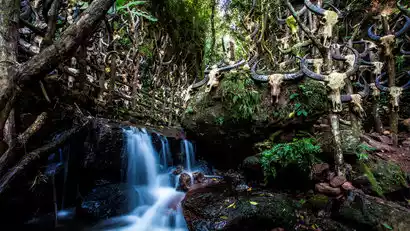
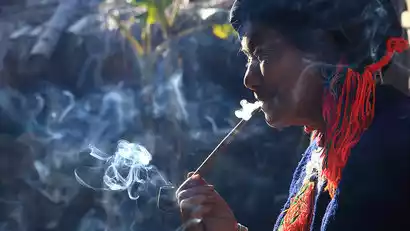
Day 5 Ximeng → Jingmai Mountain
·morning
As soon as they can walk, they can sing: Lao Dabao encounters the Lahu people
After breakfast, we'll travel to the renowned Lahu village of Lao Dabao. Lahu, meaning "tiger hunters," prides itself on the idea that "as soon as they can talk, they can sing; as soon as they can walk, they can dance." They once represented Yunnan on the Spring Festival Gala. Visit a Lahu family and learn about the past and present of the Lahu people in their stilt houses. Over dinner, enjoy a Lahu song and dance performance, listen to a Lahu toast song, and learn a Lahu dance, experiencing the authentic singing, dancing, and warm hospitality of southwestern Yunnan's ethnic groups.
Special Experience: Lahu Lusheng Dance, Learn about Intangible Cultural Heritage
Lusheng Dance is the representative dance of the Lahu people. Lahu people insert five bamboo tubes into a gourd to make a Lusheng, which can produce melodious tunes. They dance while playing the Lusheng. Most of the dance movements are derived from the daily life of the Lahu people. There are dances that express production labor such as sharpening knives, weeding, and plowing, as well as frog dances and sika deer dances that imitate animals. The simple happiness flows with the dance steps.
·afternoon
Take a light hike through the ancient tea forest and learn about the past and present of this world heritage site
Since the 10th century, the Bulang people have discovered wild tea trees and cultivated them artificially, developing a unique "under-forest tea" cultivation method that has persisted for over a thousand years, leaving behind five precious ancient tea forests. Upon arrival at Jingmai Mountain, we'll travel to the Dapingzhang Millennium Ancient Tea Garden in Jingmai Mountain, where we'll wander the grounds and discover these unassuming yet time-honored ancient tea trees.
Visit Wengji Ancient Village and watch the sunset in the mountains
Finally, we arrived at the Wengji Bulang Ancient Village. The village's pristine state of preservation and the simplicity of its villagers were truly moving. The ancient trees, represented by 3,000-year-old cypresses, the ancient tea trees, and the traditional tea culture made this ancient village speechless yet profound. We walked through the Wengji Ancient Temple and the heart of the village, listened to the history of the Bulang people, and viewed the quaint buildings and roads in the village, gaining a deeper understanding of the culture of Jingmai Mountain.
·night
Special Experience: Fireside Night Chat, Roasted Tea, and Bulang Singing
The Bulang people are recognized by academics as the forefathers of tea cultivation in Yunnan. Jingmai Mountain boasts numerous thousand-year-old tea trees, where it's common for both men and women to drink roasted tea and smoke dry tobacco. In the evening, enjoy a special Bulang family dinner. Afterward, gather around a traditional fire pit and enjoy a pot of traditional roasted tea. Witness the local elders, who drink every three days, remembering the leisurely life of tea picking, and experience the charm of this millennial tea-growing people. As the sanxian (three-stringed instrument) plays, the melodious, ancient tune slowly unfolds, transporting you back a thousand years. Learn a few words of Bulang dialect, and the Bulang people's simplicity and warmth will be captured through tea and song.
We stayed at an inn in Jingmai Mountain that night, bidding farewell to the hustle and bustle of the city and enjoying the tranquility of Jingmai Mountain. Looking up, we saw the brilliant starry sky. Here, we could see the world and ourselves.
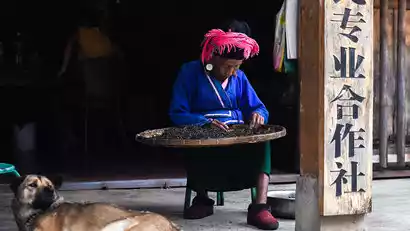
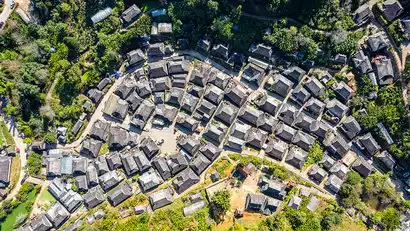
Day 6 Jingmai Mountain → Jinghong ★ Disbandment Day
·morning
Sunrise at Jingmai Mountain, the sea of clouds rippling like a fairyland
Get up early to watch the sunrise. The temperature plummets at night, and condensation creates a chance to witness a sea of clouds. Waves of cloud lap against the mountain's base before gradually receding, shrouding the entire tea mountain in mist. It's truly a dreamlike experience. Admire the beauty of Pu'er Tea Mountain as the sun rises. Alternatively, wake up early to the sound of insects chirping and enjoy a lazy night's sleep amidst the tranquility of Jingmai Mountain.
Ancient Village Citywalk: Telling the Customs of the Aboriginal People of Tea Mountain
The Bulang people are recognized by academics as the forefathers of tea cultivation in Yunnan. Jingmai Mountain boasts numerous thousand-year-old tea trees, where it's common for men and women to drink roasted tea and smoke dry tobacco. After breakfast, we'll travel to Mangjing Village, one of the nine ancient villages in the Jingmai Mountain Ancient Tea Forest Cultural Landscape in Pu'er. Home to the well-preserved Bee God Tree and a temple dedicated to the ancestors of tea, these villages reveal the harmonious coexistence of generations of local people with nature. Finally, we'll visit Nuogan Ancient Village, the primary filming location for the TV series "Home at One Point." The Dai people here may differ from the typical Dai tradition. Long-time residents of Jingmai Mountain, they possess both the gentleness of traditional Dai and the boldness of the mountains. Truly captivating is the village's quaint simplicity and tranquility. The original stilt houses are well-preserved, and the villagers live comfortably within the village. This peaceful atmosphere has earned the village its reputation as a "true paradise."
Jingmai Mountain Heritage Exhibition Center, witness the charm of world cultural heritage
Then we went to the Jingmai Mountain Heritage Exhibition Center, where sand table maps of Jingmai Mountain, production tools, ethnic costumes, etc. are displayed. Wandering around the exhibition center, you can form an overall impression of Jingmai Tea Mountain from the perspectives of history, culture, and the factors that led to its successful application for World Heritage.
·afternoon
Send you to the airport/station and say goodbye at the end of your trip
We will depart Jingmai Mountain around 14:00 and arrive at Xishuangbanna Gasa Airport around 18:00 for a group transfer. We will arrive at Xishuangbanna Railway Station around 18:30 for a group transfer. For the return trip, please book a train departing after 19:30 or a flight departing after 19:30. Please relax this schedule during holidays. If you need to continue to Jinghong City, you will be dispersed near Manting Park.
P.S.: Lancang Jingmai Airport also has flights from Lancang to Kunming. If you need to catch a flight there, you can leave the group early in Huimin Town and take a taxi to Lancang Jingmai Airport. The drive from Menglian to Lancang Jingmai Airport is about 1.5 hours. Please be careful to manage your time to avoid missing your flight.
